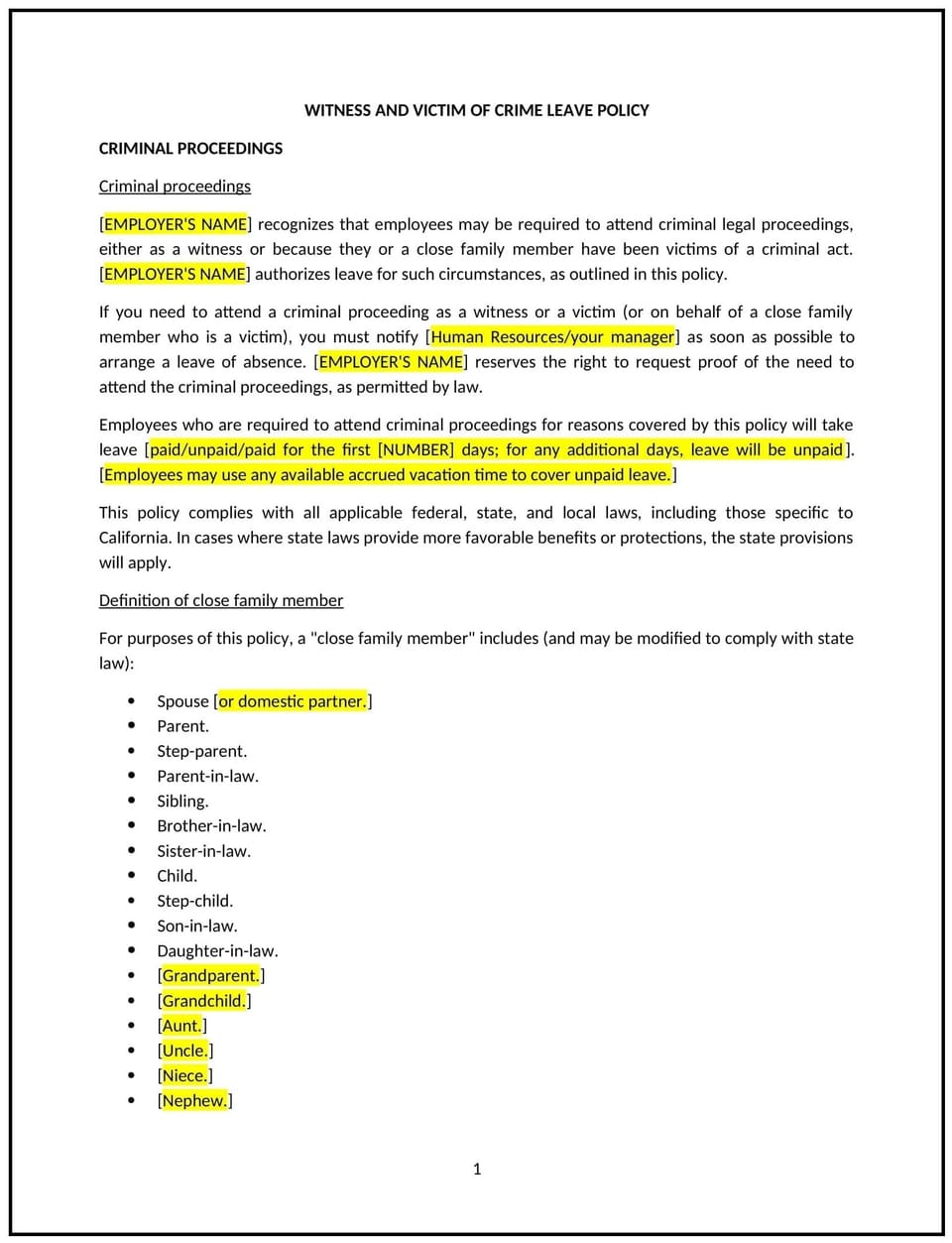Witness and victim of crime leave policy (California): Free template

Witness and victim of crime leave policy (California)
In California, a witness and victim of crime leave policy provides businesses with guidelines for granting employees time off to participate in legal proceedings or recover from a crime-related incident. This policy ensures compliance with California labor laws, such as Labor Code Sections 230 and 230.1, which protect employees taking leave as victims of crime or witnesses.
This policy outlines eligibility, procedures for requesting leave, and the business’s expectations for employees during the leave period. By implementing this policy, California businesses can support employees’ legal and emotional needs while maintaining compliance with state laws.
How to use this witness and victim of crime leave policy (California)
- Define eligibility: Specify which employees are covered under this policy, including victims of crime, family members of victims, and those subpoenaed as witnesses.
- Communicate rights: Ensure employees understand their right to take leave for legal proceedings or to recover from crime-related incidents without fear of retaliation.
- Outline request procedures: Provide clear steps for requesting leave, including advance notice, where possible, and required documentation, such as a subpoena or police report.
- Address pay and benefits: Clarify whether leave is paid or unpaid and how benefits, such as health insurance, will be maintained during the leave period.
- Ensure confidentiality: Protect the privacy of employees taking leave under this policy, particularly for sensitive crime-related matters.
Benefits of using this witness and victim of crime leave policy (California)
This policy offers several advantages for California businesses:
- Supports compliance: Reflects California labor laws protecting employees’ rights to take leave for legal or recovery purposes.
- Promotes fairness: Provides clear guidelines for granting leave, ensuring equitable treatment for all employees.
- Reduces risks: Minimizes potential legal disputes by adhering to state-mandated leave requirements.
- Enhances employee well-being: Supports employees during difficult times, fostering trust and loyalty.
- Protects business reputation: Demonstrates the business’s commitment to supporting employees’ legal and emotional needs.
Tips for using this witness and victim of crime leave policy (California)
- Reflect California-specific laws: Ensure compliance with Labor Code Sections 230 and 230.1, which outline employee rights to leave for legal proceedings or recovery.
- Train managers: Provide guidance on handling leave requests sensitively and lawfully.
- Encourage communication: Create an open and supportive environment where employees feel comfortable requesting leave under this policy.
- Maintain documentation: Keep records of leave requests and approvals to ensure transparency and legal compliance.
- Review regularly: Update the policy to reflect changes in California laws or workplace practices.
Q: How does this policy benefit the business?
A: This policy supports compliance with California laws, fosters employee trust, and demonstrates the business’s commitment to supporting employees during difficult times.
Q: What types of leave are covered under this policy?
A: Covered leave includes time off for legal proceedings as a victim or witness, or for recovery related to a crime, as defined by California labor laws.
Q: How does this policy support compliance with California laws?
A: The policy reflects California Labor Code Sections 230 and 230.1, ensuring lawful leave practices and protecting employees from retaliation.
Q: What steps should employees take to request leave under this policy?
A: Employees should notify HR or their manager, provide advance notice where possible, and submit supporting documentation, such as a subpoena or police report.
Q: How can the business support employees during leave for crime-related matters?
A: The business can maintain open communication, respect privacy, and provide access to resources such as employee assistance programs.
This article contains general legal information and does not contain legal advice. Cobrief is not a law firm or a substitute for an attorney or law firm. The law is complex and changes often. For legal advice, please ask a lawyer.


